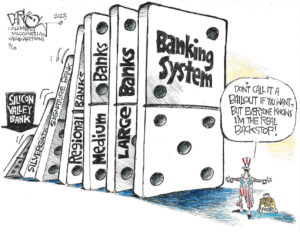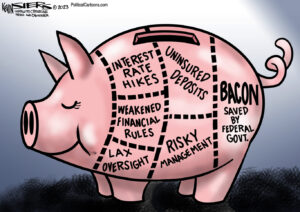Blame Your Puny Paycheck
This didn't start with the mortgage and credit crisis. It all began with the wage crisis.The hyperbolic sales pitch about the big stimulus bill comes to a close with the president’s signature on the landmark legislation. Time now for the more extravagant political marketing job needed for the enormous bailout of the financial industry that is still to come and, in all likelihood, the failure (though we won’t necessarily call it that) of some very large banks.
The pause between promotional efforts allows for reflection on what the stimulus measure — or, for that matter, the herculean effort to get the banks in better shape — will and will not do. If we are lucky, both will slow the bleeding that is sapping the economy in ways that only those who lived through the Great Depression can readily imagine. Stabilizing the patient is about all we can hope for.
The rock-bottom line of the economic crisis isn’t that people took out mortgages they couldn’t pay while shady brokers and rapacious financiers were all too happy to give them out, then buy them up and resell them to some unwitting investor. These are all symptoms of a disease that took hold deeper in the economy.
For too many years, too many people — the majority of Americans, in fact — just didn’t make enough money to maintain a middle-class living. Though some liberal economists complained about this, few listened. Conservatives, meanwhile, promoted an alternate focus on the big homes, big cars, big TVs and other accouterments of ”living large” that were supposed to demonstrate an ever-rising standard of living. All this bigness was bought with big credit card balances and even bigger scams involving mortgages that were so appallingly flimsy in their requirements that Bernie Madoff could have dreamed them up.
Who to believe? How about the Federal Reserve.
Its latest survey of family finances was released last week. It covers the period between 2004 and 2007 — before the cascade of economic misfortune rained down hard in 2008. The Fed lays it all out: “Median incomes declined over the 2004-07 period for all groups except childless, single families. … The largest decline (4.5 percent) was for couples … with children.”
Yup, those very hard-working American families so venerated in political speeches and campaign commercials. The same politicians who use these families as props were willfully blind to the downward trajectory of their lives. Many of them promoted policies that sped this spiral while they lifted up the fortunes of their most fortunate political backers.
Three years does not make an economic lifetime. So what was going on before that? “Median income measured in the survey had been relatively flat for all income groups since 2001 after an earlier period of growth before 1998,” the Fed says.
So incomes flat-lined for most of the decade, then began to sink. Americans made up for the gap between income and expenses with deficit spending. The Fed report says nearly half of families carried a credit card balance in 2007. The median balance rose by 25 percent during the three years of the survey and stood at about $3,000.
This is what the ledger looked like before the millions of layoffs, pay cuts and freezes and all-around misery now forced upon us. This didn’t start with the mortgage and credit crisis. It all began with the wage crisis.
Back in the 1980s, it was fashionable for Democrats to campaign through the bleak landscape of what was becoming the Rust Belt and pledge that we would not — could not — become “a nation of hamburger-flippers.” Well, we didn’t. In the 1990s, at least some of us became tech wizards, while others became what we believed to be financial geniuses, exporting American ingenuity in the form of incomprehensible investment instruments.
And through it all, those who complained that globalization was depressing the wages of Americans who simply couldn’t — and shouldn’t — have to compete with cut-rate workers who toil under inhumane conditions were shunned as hopelessly retro. Those who argued that American businesses shouldn’t be forced to choose between providing health insurance for workers or shipping the jobs overseas, where governments finance the health care burden, were dismissed as promoters of “socialized medicine.”
So here we are, hoping that a stimulus package that is bigger than anything since the New Deal will bring new prosperity. In the short term, that is possible. In the long term, it’s not likely. Nothing will do the job until we return to the bedrock principle that good paydays make for a good economy.
Marie Cocco’s e-mail address is mariecocco(at)washpost.com.
© 2009, Washington Post Writers Group
Your support matters…Independent journalism is under threat and overshadowed by heavily funded mainstream media.
You can help level the playing field. Become a member.
Your tax-deductible contribution keeps us digging beneath the headlines to give you thought-provoking, investigative reporting and analysis that unearths what's really happening- without compromise.
Give today to support our courageous, independent journalists.




You need to be a supporter to comment.
There are currently no responses to this article.
Be the first to respond.